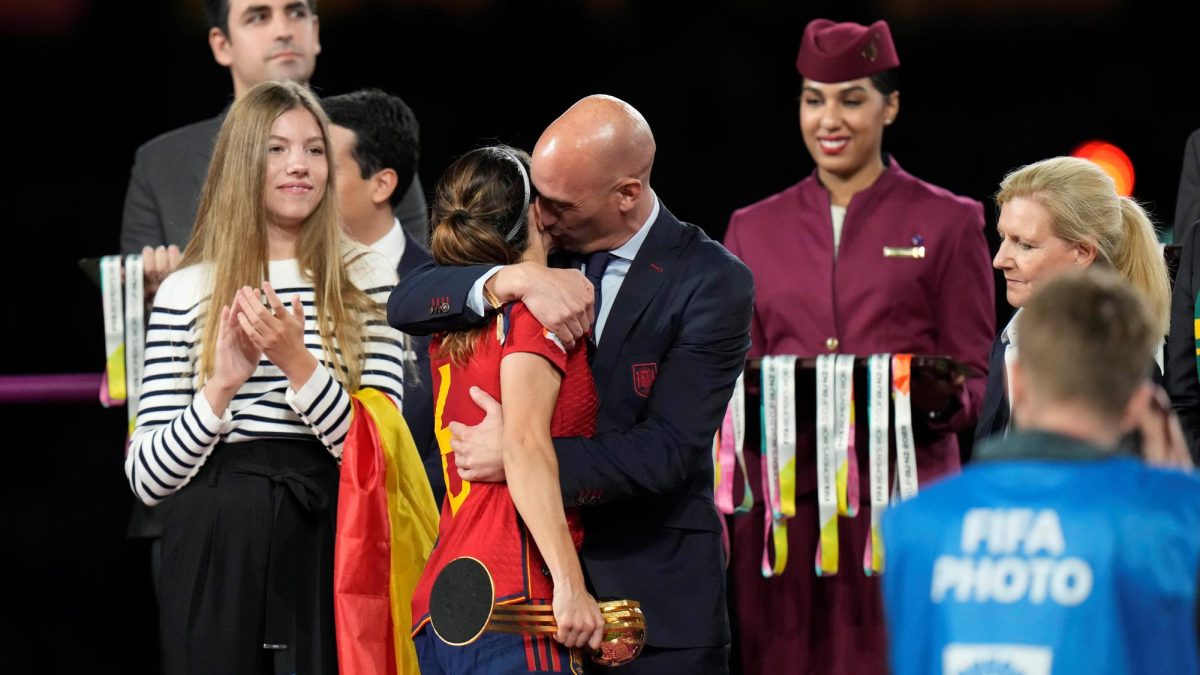In the aftermath of the 2023 Women’s World Cup, there is genuinely so much to be happy for and celebrate. The scenes of host country Australia backing their Matildas team is one that will undoubtedly give you goosebumps. Progress can be found in so many places throughout women’s soccer in the present day, whether that be through viewership numbers or revenue in tickets at both national and club levels. However, as the sport continues to become more visible and mainstream, the light on the injustices, harassment and blatant sexism by those who are at the very top shines brighter, and brings forth story after story of what these women have had to endure to get to this point. That unfortunately is still not a thing of the past, with Spain’s Soccer Federation and FIFA itself showing that there is so much more to accomplish in the fight to make women’s sports equal.
For those who don’t know, Spain won its very first Women’s World Cup this year. The athletes on this team have been dealing with unrest within its management and front office publically for the better part of a year and even longer behind closed doors. In September 2022, 15 of Spain’s National Team players refused call-ups as a protest against their now former manager Jorge Vilda. The players stated that Vilda was controlling, and his management negatively impacted their health both physically and mentally. Furthermore, it was reported that the manager frequently would inspect players’ personal belongings and until 2019, forced players to leave their hotel room doors unlocked to perform bed checks. Spain’s federation RFEF replied by emphatically standing with Vilda and that if any player wanted to ever return, an apology would be required. Of the 15 who initially quit, only three were brought back for the World Cup roster. It took well over a year to actually fire him, providing setbacks to several professional players who felt uncomfortable playing for their country. While it’s positive Vilda is no longer involved with this team, the way Spain handled this was not.
It unfortunately doesn’t stop there. The President of RFEF, Luis Rubiales, who was Vilda’s main supporter early in the year, unsurprisingly found himself in a similar situation after acting incredibly inappropriately on the world’s biggest stage. During Spain’s medal ceremony, Rubiales pulled player Jenni Hermoso’s face in and kissed her on the lips. Hermoso was immediately taken aback and expressed her discontent with the action.
To be crystal clear: this is abuse in itself. For Rubiales to feel so comfortable doing this when he knows for a fact cameras are on him, what is he capable of when there are no cameras? And given his support for manager Vilda’s inappropriate coach-to-player interactions, it’s hard to imagine what else has gone on within this country’s team. Rubiales has also claimed that he had asked Hermoso for a small peck prior to the medal ceremony, which even if true, is just blatantly inappropriate when you consider the power dynamics of a boss asking an employee to kiss him. Admitting that, which is likely a lie in itself given other footage released, was a move that’s led many to scratch their heads.
After ridiculously unbelievable speeches given by Rubiales, who claims he is a victim of “fake feminism” and “social assassination,” we are left with more questions than answers. Players from all across every women’s league in the world have sent an outpouring of support for Hermoso along with several players from Spain’s Men’s National Team. As of now, Rubiales is expected to either be fired or asked to resign in the coming days or weeks, and as of Tuesday, Sept. 5th, RFEF officially fired Vilda, but with how this has all played out there is genuinely no way to guess which direction this is heading until something is officially announced.
This situation has left fans and journalists of the sport with a moral dilemma. In the wreckage of these stories, the spotlight has shifted away from a history-making win for the Spanish women who have just earned their first World Cup. It’s almost become the afterthought of the tournament itself, which is obviously not fair to the players who have just achieved the highest honor in all of soccer.
However, the other side to this is that if these instances of abuse go unspoken about and don’t make mainstream news, the road to progress becomes more difficult. Look at the American National Women’s Soccer League. A couple of years ago the league was plagued with horror stories of players dealing with every kind of abuse from coaches and front office staff. It was uncomfortable and heartbreaking to hear about, but swift action was taken in a complete overhaul of coaches and staff all around the league, and as far as the general public is aware of, the well-being of players has increased dramatically.
There’s a wider scale issue here as well that was painted perfectly by a quote given in a speech by FIFA President Gianni Infantino. Infantino said of the progress of women’s soccer, “say to all the women that you have the power to change. Pick the right battles. Pick the right fights. You have the power to change. You have the power to convince us men what we have to do and what we don’t have to do. You do it. Just do it. With men, with Fifa, you will find open doors. Just push the doors. They are open.” There’s a lot to dissect here. The boldness Infantino has to speak to a group of women who have paved their own way to progress in their sport with oftentimes no help from their male leaders that they “will find open doors” is like a slap to the face.
Furthermore, telling these athletes and staff members to “convince us men what we have to do” is in itself an assumption that women aren’t in those positions to make change. When there are no women in the room to make decisions about a sport that is played by majority women, that’s when you have to look around and realize that there might be a reason so many issues plague the women’s game like we’ve seen time after time.
It’s a bittersweet time to follow women’s soccer. Spain and the rest of the world have caught up to the previously dominant United States Women’s National Team, which will make tournaments more competitive and generally fun to watch. The World Cup smashed all expectations of attendance and revenue, and club levels in Europe, Spain and America continue to break records. There’s clearly a lot to be excited about in the game itself even with the horrific off-the-field stories. If this World Cup has taught us anything, it’s that progress has absolutely been made, but there is a lot of space to grow and be better at fundamental levels to protect the players.











































































































































































































